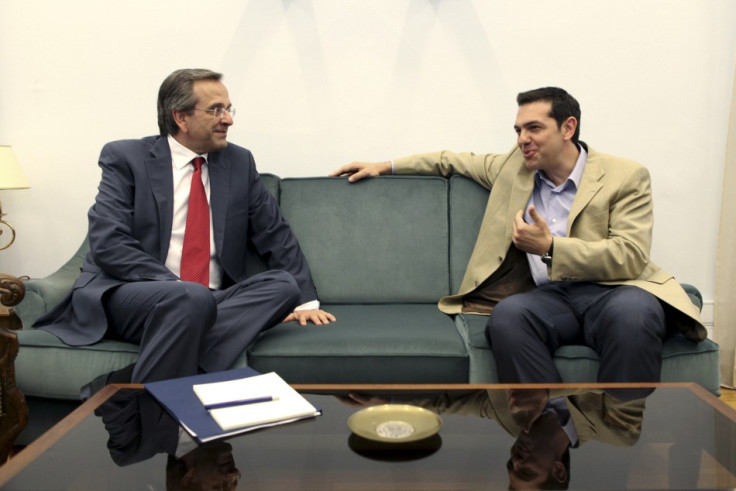Antonis Samaras Starts Talks to Form New Coalition Government in Greece
Greek leaders seek amendments to bailout agreement to ease burden on people despite strong opposition from Germany.

Antonis Samaras, the leader of the centre-right New Democracy party who won the Greek election with a narrow margin, began talks with leaders of other political parties to forge a new coalition government at the earliest.
New Democracy won the election with 29.7 percent of the vote, slightly ahead of Syriza on 27 percent and Pasok on 12.3 percent.
Samaras has reportedly promised to water down the painful austerity measures despite strong opposition from Germany, in an effort to form a pro-bailout government that will keep Greeks in the euro currency.
"We will simultaneously have to make some necessary amendments to the bailout agreement, in order to relieve the people of crippling unemployment and huge hardships," Reuters quoted Samaras as saying.
Samaras, the designated prime minister, is in the process of meeting leaders of all political parties after receiving consent from Greek President Karolos Panoulias to form a government.
He also already met with the Pasok Socialists and the small Democratic Left group, as well as Syriza leader Alexis Tsipras. Although Tsipras is not expected to join the coalition, his party nearly doubled its share of the vote in the election, held on 6 May.
Pasok, which placed third in the election, and the Democratic Left are expected to hold cabinet positions in the new government.
"We are going to clinch a deal tomorrow, we will form a government," a senior New Democracy leader told Reuters, indicating that Greece will be in the hands of the parties which led the country to its present predicament.
"The new government must deliver a positive development soon - an easing of the bailout terms or a positive sign in the economy - or people will lose trust in a week," the unnamed official added.
Watered down austerity?
While Greek leaders are working toward easing the strict and unpopular austerity conditions, Germany expects it to honour exiting agreements.
"The new government will and must stick to the commitments, which the country has agreed on," German Chancellor Angela Merkel said on the sidelines of G20 meeting in Mexico.
The German foreign minister also ruled out any dilution in the bailout terms, except for some flexibility on timing to attain some of the targets.
"We're ready to talk about the time frame as we can't ignore the lost weeks and we don't want people to suffer because of that," German foreign minister Guido Westerwelle said.
Impatience was also growing among world leaders, with most of them seeking speedy action from the Greeks.
"We are waiting for Europe to tell us what it's going to do," Sky News reported World Bank chief Robert Zoellick as saying.
Prime minister David Cameron also warned the Greek leaders to act fast and said "a delay could be deadly".
Officials from the lenders - the IMF, the European Commission and the European Central Bank - will visit Greece once the new government is formed.
Analysts remain sceptical about the future of the new government.
"The crisis has been postponed, not necessarily averted. For this government to last it has to show results. You can't continue with 50 percent youth unemployment and a fifth straight year of recession," Theodore Couloumbis, political analyst and vice president of the Athens-based thinktank ELIAMEP, said.
Greece is in its fifth year of recession, which has left the domestic economy almost stagnant and a rising number of homeless people. Protests against the reforms have become a regular feature in Athens.
© Copyright IBTimes 2024. All rights reserved.





